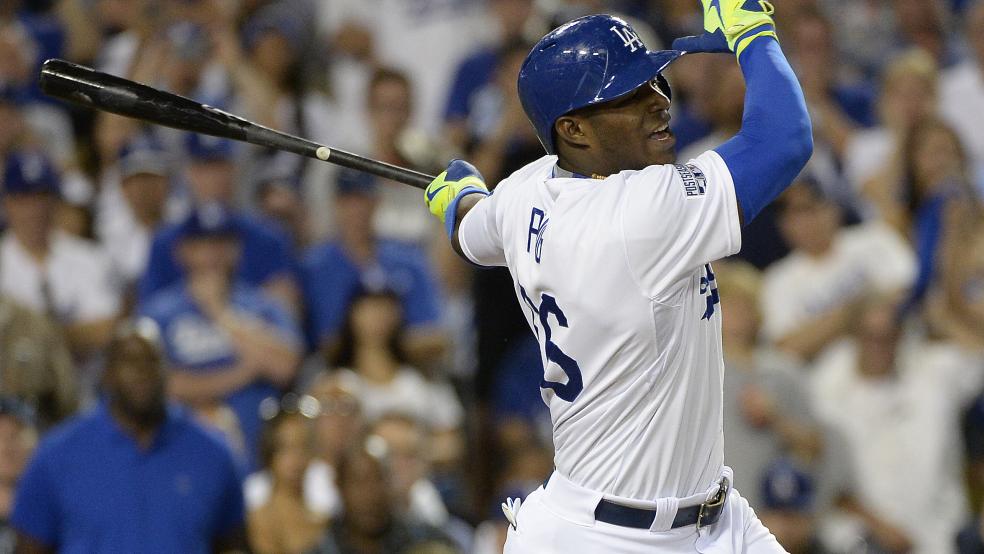For the past two years, Yasiel Puig has been one of the best players in Major League Baseball. Signed to a $42 million contract, the Los Angeles Dodgers outfielder has slashed .305/.386/.502 (average/on-base percentage/slugging percentage) since his 2013 debut, making him the fifth-best hitter in that span, per one all-encompassing offensive metric.
But like many Cuban-born players, Puig's journey to the big leagues could easily have ended in disaster and death, not riches and fame.
With the U.S. trade embargo on Cuba firmly in place, Puig turned to smugglers to sneak off the island. And as has been well documented in two unbelievable features in ESPN and Los Angeles Magazine, the escape soon turned into more of a kidnapping, with smugglers linked to the Zetas cartel stranding Puig and other defectors in a Mexican hotel room and threatening to hack off body parts until they received payment.
Puig is not alone. More than 200 Cuban players have defected to the U.S. in the last two decades, often through dangerous channels. So though the Obama administration's decision to normalize relations with Cuba is most notable for its significant geopolitical ramifications, the move will also reverberate through Major League Baseball.
Related: Can Business Succeed Where the Embargo Failed in Cuba?
From 1940 to 1969, 94 Cuban-born players appeared in MLB games, according to Baseball Reference. But over the next three decades, with the Cuban embargo throttling the pipeline, just 25 made it to the bigs. But contracts have exploded in recent years, particularly for Cuban players. And as a result, there are now more incentives than ever for Cuban players to defect by any means necessary — and more incentives for smugglers to make it happen. In the last five years alone, 25 Cubans have made The Show.
"You have a player who can go from playing on a high-caliber team here in Cuba, where you can't even get bats," Antonio Casto, Fidel's son, told ESPN earlier this year, "to the next day making millions playing for the Yankees or the Dodgers."
Enter the smugglers, who have "pretty much taken over" the business of aiding defectors, former baseball agent Joe Kehoskie told NPR. Though many Cubans still opt for dangerous cross-sea journeys on their own, human traffickers have carved out a lucrative underground market shipping players to the States.
Obama's attempt to thaw relations with Cuba will have little immediate impact on the seedy smuggling market. Congress still has control over the decades-old embargo between the two nations. And given the apoplectic reaction on the right to Obama's announcement, that embargo may not be going away anytime soon.
Related: Cuba Trade Easing-Good News for Cigar Aficionados
Yet U.S.-Cuba negotiations could result in an easing of the economic blockade even without Congress' help. With the return of diplomatic ties originally severed in 1961, there could be a freer flow of goods and, perhaps with it, players.
Since the embargo went into effect, MLB has forced players to effectively renounce their citizenship before allowing them to sign with teams. And back in 2012, the league toughened its rules on Cuban signings, requiring players to obtain special certification from the Treasury Department identifying them as "unblocked nationals," meaning they had to prove residency in a country not bound by a blockade.
Even before Wednesday's announcement though, that restriction had begun to erode.
In the fall of 2013, Cuba's Council of Ministers lifted a ban on athletes playing pro sports abroad. Players still couldn't come directly to the U.S. because of the embargo, but the tweak created a workaround for them to move abroad as a potential stepping-stone to MLB. It's not unthinkable that negotiations aimed at boosting commerce between Cuba and the U.S. could further widen that loophole. There's also been a dramatic improvement over the past few years in the technology and communications tools used to scout Cuban players. For instance, slugger Yoenis Cespedes made waves before signing in the majors with a ridiculous YouTube highlight reel.
Related: 20 American Cars That Rock Cuba
An easing of restrictions between the U.S. and Cuba would allow scouts even greater access to star players on the island. It would take time, but teams could potentially establish academies on Cuban soil much like they've already done in Latin America and the Caribbean, creating a direct pipeline that supplants the one underground.
Clearly, MLB teams are eager to get their hands on more Cuban talent. But even with improved relations with the U.S., Cuba may make that difficult. Looser travel and trade restrictions are one thing, but allowing American teams to sap the island of its cherished players for a massive capitalistic enterprise might be too great of a leap, at least in the near future.
"I don't think Cuba is ready to hand over its baseball to MLB," Peter Bjarkman, a Cuban baseball expert, told Fox Sports.
On Tuesday, one day before Obama announced the landmark policy shift, a Florida businessman pleaded guilty to participating in the smuggling operation that brought Puig to America. Improved relations between the U.S. and Cuba won't eradicate such dark dealings overnight, but they could very well make it easier for Cuban players to eventually reach the pros through safer, saner, and more lawful methods.
This article originally appeared in The Week.
Read more from The Week:
Capitalism isn't a cure-all for Cuba
Why torture doesn't work: A definitive guide
Why Obama was right to give Cuba a 'full bailout'




